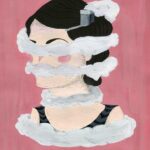Intrusive Thoughts and OCD

Intrusive thoughts can be loud, strange, and downright terrifying. They often show up uninvited—random and unwanted—cutting across your mind in ways that feel alien to your values, identity, or desires. While they can be disturbing, intrusive thoughts are actually a normal part of how the human brain works. Most of us experience them at some point. But when these thoughts become persistent, distressing, or lead to compulsive behaviors, it may be a sign of a mental health condition such as Obsessive-Compulsive Disorder (OCD).
What Do Intrusive Thoughts Sound Like?
Intrusive thoughts can range from the mundane to the bizarre, from anxious “what ifs” to disturbing images or urges. Some common examples include:
- “What if I left the oven on and the house burns down?”
- “What if I didn’t wash my hands and I get sick?”
- “What if my partner doesn’t really love me?”
These are typical in anxiety or perfectionism. But intrusive thoughts can also take more alarming forms, including:
- Magical thinking: “Something bad will happen if I wear a red shirt.”
- Commands: “Jump off the ledge” or “Say something offensive right now.”
- False doubts: “What if I cheated on my partner but didn’t realize it?”
- Shocking statements: “I’m a bad person” or “I don’t love my partner.”
- Taboo fears: “What if I’m secretly attracted to animals?”
- False urges: “I want to swerve into oncoming traffic.”
- Violent or self-harm thoughts: Even if you would never act on them.
- Disturbing mental images: Unwanted, vivid scenes that feel out of place.
- Philosophical spirals: “What if life has no meaning?”
Why Are These Thoughts So Distressing?
Intrusive thoughts are ego-dystonic—meaning they conflict with your true values, intentions, and sense of self. That’s exactly why they feel so unsettling. If you’re someone who values kindness, safety, or morality, having a violent, taboo, or disturbing thought can shake you to your core.
For people with OCD, these thoughts become more than just fleeting worries. They feel like urgent threats. The brain tries to neutralize the discomfort by engaging in compulsions—such as checking, cleaning, asking for reassurance, or mentally reviewing past events. This creates a painful cycle.
Intrusive Thoughts and OCD: When to Seek Help
While everyone experiences intrusive thoughts occasionally, if they:
- Recur frequently and feel overwhelming
- Lead to compulsive or ritualistic behaviors
- Make you doubt your own identity, morality, or safety
- Cause intense anxiety, shame, or isolation
…it could be a sign of Obsessive-Compulsive Disorder or another anxiety-related condition.
OCD is not just about cleaning or organizing—it’s about unwanted, intrusive thoughts and the desperate mental effort to make them go away. And it’s treatable. With the right support, such as Cognitive Behavioral Therapy (CBT) and Exposure and Response Prevention (ERP), individuals can learn to manage these thoughts and reduce their power.
Let’s Normalize Talking About Intrusive Thoughts
You’re not your thoughts. And you’re definitely not alone.
Intrusive thoughts don’t mean you’re dangerous, broken, or immoral. In fact, the more disturbed you are by them, the more it shows they don’t reflect your actual self—they reflect your deepest fears, not your desires.
Let’s normalize the fact that the brain is a weird, creative machine. Sometimes it throws out the worst-case scenarios, inappropriate ideas, or fearful questions. That’s just part of being human.
If You’re Struggling: Reach Out
Therapists trained in OCD and anxiety disorders can help you untangle the thoughts from your identity, reduce the need to act on compulsions, and guide you toward healing.
Remember: A thought is not a fact. A thought is not a threat. A thought is not you.



Comments (0)